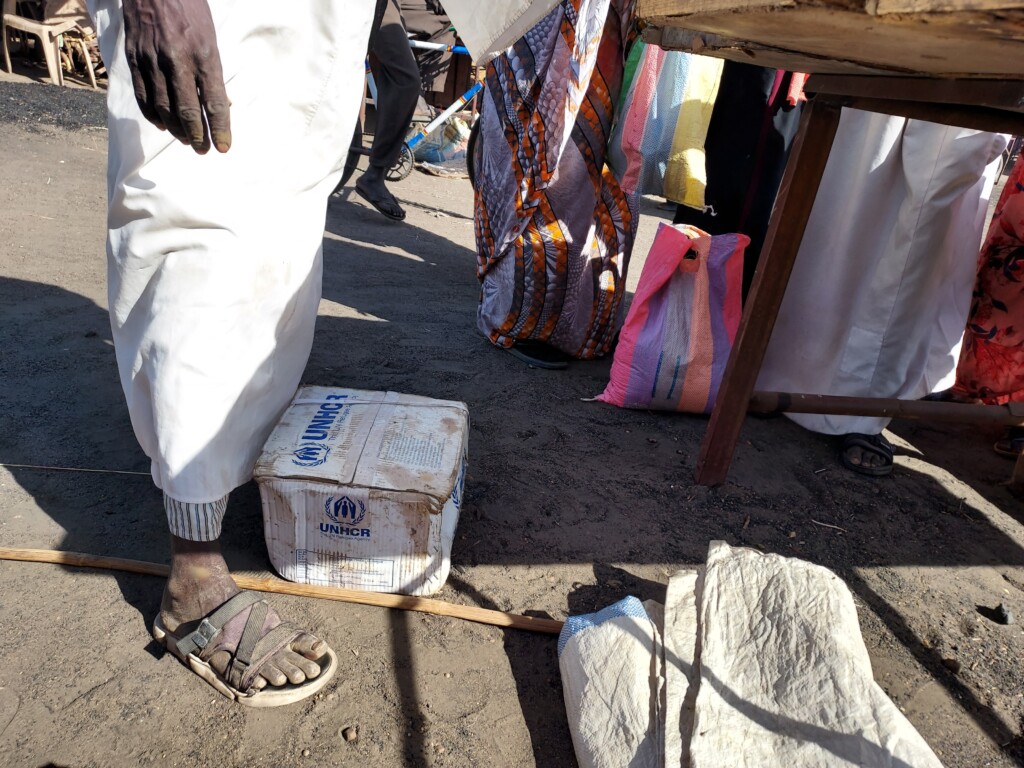South Darfur attacks persist in spite of ‘cessation of hostilities’

A (presumably stolen) UNHCR aid package sold at a market in Sudan (File photo: RD)
BELEIL / MERSHING –
People living in Beleil, north-east of South Darfur capital Nyala, reported the continuation of attacks in the area despite the reconciliation agreement signed recently. Support and aid are not delivered as promised, they lament.
Niemat, a women’s leader in Beleil, told Radio Dabanga yesterday that the security situation in the area is still fragile despite the signing of the ‘cessation of hostilities’ agreement between the Daju and Rizeigat last week.
Niemat said yesterday that “militiamen assaulted three women from Amori village while the governor of South Darfur and members of the state’s security committee were holding a meeting in the same area in the presence of a joint security force, the Rapid Support Forces (RSF), and the police force”.
“The forces did not move to confront the assailants, despite being informed of what happened,” she said. “These militiamen are still attacking unarmed people in the area and are releasing their livestock on our farms. Many people in the area do not dare to leave their homes to go to their work.”
At the time of signing, the agreement was already met with scepticism. Lawyer Saleh Mahmoud, head of the Darfur Bar Association, said that the “tribal reconciliations in Darfur are superficial and fragile, and do not necessarily reflect the real demands of the victims”.
He also said that the authorities are putting pressure on community leaders to sign tribal reconciliation agreements, often under auspices of the infamous RSF. The victims of the Beleil violence repeatedly stated that gunmen in RSF uniforms took part in the attacks.
RSF assault
Mid-December, groups of gunmen, some of them wearing uniforms of the Rapid Support Forces (RSF) militia and driving in RSF vehicles, attacked more than 10 villages in Beleil locality, populated by formerly displaced Daju farmers families who returned to their villages a few years ago.
At least 15 villagers died and more than 16,000 people were displaced again.
On Wednesday, community leaders reported that the losses resulting from the burning of villages in Beleil are estimated at about SDG$130 million as roughly 15 villages were either partially or completely plundered and burned down, while 11 other villages were plundered only.
The sultan of the Daju, Jaafar Ibrahim, said in a press conference in Khartoum on Tuesday that “the brutal attacks on villages in Beleil locality were carried out by armed groups using four-wheel drive vehicles and wearing uniforms of the Rapid Support Forces”.
Neglected promises
She said that the promises made by Deputy Chairman of the Sovereignty Council Lt Gen Mohamed ‘Hemeti’ Dagalo, who is also the RSF Commander-in-Chief, when he visited the area “have not been realised, especially with regard to providing urgent humanitarian aid and securing the region, protecting villagers, rebuilding the burnt villages, and compensating those affected by the events”.
Niemat reported that many humanitarian aid packages that reached the villages in Beleil have been smuggled to Nyala and other areas to be sold there.
“The aid was not distributed to those affected in a fair manner, many of them did not receive any assistance,” she said.
The Director of Beleil locality has set up a committee to distribute aid that does not include any of the affected people, Niemat explained and called on organisations who provide humanitarian aid to the affected to deliver the aid themselves.
She further reported that three villagers who sustained burns during the attacks are still undergoing treatment at the Nyala Teaching Hospital and that no assistance has been provided to them from any official agency.
“They are now being pressured by the hospital staff to leave the hospital before their wounds have healed, as their families cannot pay the treatment.”
She appealed to humanitarian and charity organisations to extend a helping hand to provide medicines for the injured.
RSF in Darfur
Darfur has a long history of strife between nomadic Arab herders and non-Arab African herders or sedentary farmers. Arab tribesmen were recruited by the previous regime of dictator Omar Al Bashir to join the Janjaweed militias. Al Bashir employed these Arab militias to repress a revolt over ethnic marginalisation in the region, mainly targeting non-Arab African farmers. The Janjaweed are held responsible for the genocide against Darfuri farmers and other non-Arab/African groups.
The RSF was established by the Al Bashir regime in 2013 and grew out of the Janjaweed militias. They are widely believed to be responsible for atrocities in the Kordofan and Darfur regions in the past years and is also widely condemned for their role in the October 25 military coup and subsequent violence against pro-democracy protesters.
Mershing
Displaced people living in camps in Mershing in South Darfur reported that the security committee of the locality called for a meeting of all native administration leaders in the area on Monday to find out who are continuously robbing people gathering firewood
A community leader from the Mershing camp for the displaced told Radio Dabanga that they welcomed the meeting. They hope hope that it will reach real solutions and stop the ongoing attacks.
Recent weeks have witnessed an increase in attacks and armed robberies of displaced as they go out to collect firewood.











 and then
and then